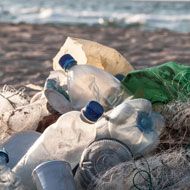New drinking fountains aim to cut plastic waste in London

Adults in the UK consume around 7.7 billion single-use plastic water bottles a year, many of which end up in rivers and the ocean.
Mayor of London Sadiq Khan has unveiled plans to cut plastic use in the city by making water more accessible to the public.
The new proposals include a network of of drinking fountains to allow Londoners to refill their water bottles, rather than throwing them away.
Twenty new drinking fountains will be installed across London as part of a pilot scheme starting in the summer, while a bottle-refilling initiative will see some businesses making tap water available to the public from February.
The move forms part of a £750,000 scheme to cut plastic waste in the capital.
Adults in the UK consume around 7.7 billion single-use plastic water bottles a year, equating to about 150 per person. Many end up in rivers and the ocean, killing marine life.
Sadiq Khan’s announcement has been welcomed by the Zoological Society of London (ZSL), which is driving these efforts through the #OneLess alliance.
ZSL director general, Dominic Jermey, commented: “We’re delighted to see this commitment from Mayor of London to increase public access to drinking water and help Londoners switch from wasteful single-use bottled water to refilling…
“As a lead partner in the #OneLess campaign, we’re driving efforts to create a ‘refill revolution’ across the Capital – not least right here on our own doorstep at ZSL London Zoo where we have got rid of all single-use plastic bottles. We look forward to working with Sadiq Khan’s team and our partners to make this exciting vision a reality.”



 The Veterinary Medicines Directorate (VMD) is inviting applications from veterinary students to attend a one-week extramural studies (EMS) placement in July 2026.
The Veterinary Medicines Directorate (VMD) is inviting applications from veterinary students to attend a one-week extramural studies (EMS) placement in July 2026.